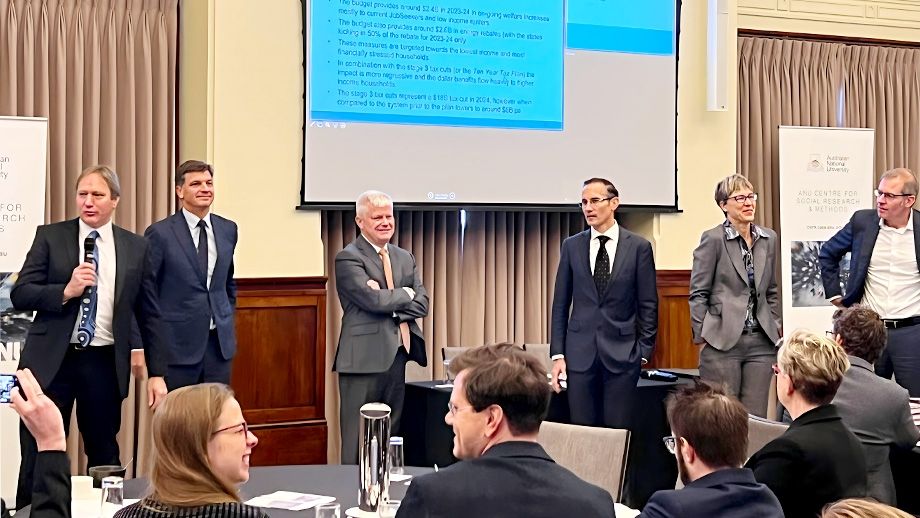Centre for Social Research and Methods Budget Breakfast 2023

At Old Parliament House, Canberra, Professor Matthew Gray, Director of ANU Centre for Social Research and Methods opened the 11 May 2023 budget breakfast.
While guests sat down to enjoy a spread, including a porridge, croissants, and steaming tea or coffee on this chilly Canberra morning, Associate Professor Ben Phillips, Principal Research Fellow at the Centre for Social Research and Methods at the Australian National University (ANU) took centre stage.
Phillips has prominently featured in budgetary discussions again this year, appearing on Mark Kenny’s Democracy Sausage Podcast, ‘Running to stand still’ and contributing his expertise for The Age and The Conversation.
Addressing a full house, Phillips focused on the distributional impacts of the major personal income tax and welfare policies of the 2023- 24 Budget. Explaining, "The budget, while not increasing payment rates to the extent recommended by the Economic Inclusion Advisory Committee, includes policies that provide around $2.8 billion per annum of additional funding for the welfare payments from 2023-24."(Phillips, Gray, Joseph, p3.). For deeper analysis see the 19 May 2023 release, 'The Budget 2023 Distribution Analysis: Research Note' by ANU Centre for Social Research Methods (Associate Professor Ben Phillips, Professor Matthew Gray, Cukkoo Joseph).
Phillips summarised, Jobseeker went up by $40 per fortnight (pf) ($693 to $733pf) or 65 per cent to 69 per cent of age pension. A higher rate was awarded for 55-60-year-old JobSeeker recipients ($693 to $785pf). Parenting Payment youngest child age increased from 8 to 14 years ($745 JobSeeker to $949pf on Parenting Payment). Rent Assistance increased by 15 per cent (single max rate increase from $157 to $181pf). Whilst an Energy rebate was introduced (up to $500 per annum (pa) for 2023-24 only) (not included in long term analysis) for welfare/card holders.
Discussion surrounding the 2023 Federal Budget has garnered significant interest this year, given the escalating cost-of-living pressures faced by Australians. It was also the first full budget delivered by the Albanese Government following the budget update shortly after their election victory on 21 May 2022. ANU Vice-Chancellor, Brian Schmidt noted, "it must feel like school again for the Treasurer and Secretary given both undertook PhDs at ANU."
Schmidt added in his blog, "There were no major announcements in education, which is not surprising as we have the Australian Universities Accord process still underway. Things that are of indirect interest include:
- $91m over two years to establish the Australian Centre for Disease Control as a new agency within the Health portfolio.
- 4,000 additional Commonwealth-supported places to support AUKUS-related skills needs.
- $3.4 billion over 10 years to establish the Advanced Strategic Capabilities Accelerator that will invest in cutting edge research to gain a technological advantage for the Australian Defence Force.
There were also changes to student visa conditions announced prior to the Budget, including an extra two years of post-study work rights for students with eligible qualifications, and the reinstatement of the working hours cap (increased from 40 to 48 hours per fortnight), both from July this year."
Guests were eager to hear from Dr Andrew Leigh MP, Shadow Treasurer Angus Taylor, top economist Chris Richardson and legal academic Professor Miranda Stewart who also provided their expertise before questions were open to the floor.
Closing remarks from Phillips summed up the key points of the latest Federal Budget. Noted was that the budget also provides around $2.6B in energy rebates (with the states kicking in 50 per cent of the rebate for 2023-24 only. These measures are targeted towards the lowest income and most financially stressed households. In combination with the stage-three tax cuts (or the Ten Year Tax Plan) the impact is more regressive and the dollar benefits flow heavily to higher income households. The stage-three tax cuts represent a $18B tax cut in 2024, however when compared to the system prior to the plan lowers to around $6Bpa.
Read more: 'The Budget 2023 Distribution Analysis: Research Note' by ANU Centre for Social Research Methods.